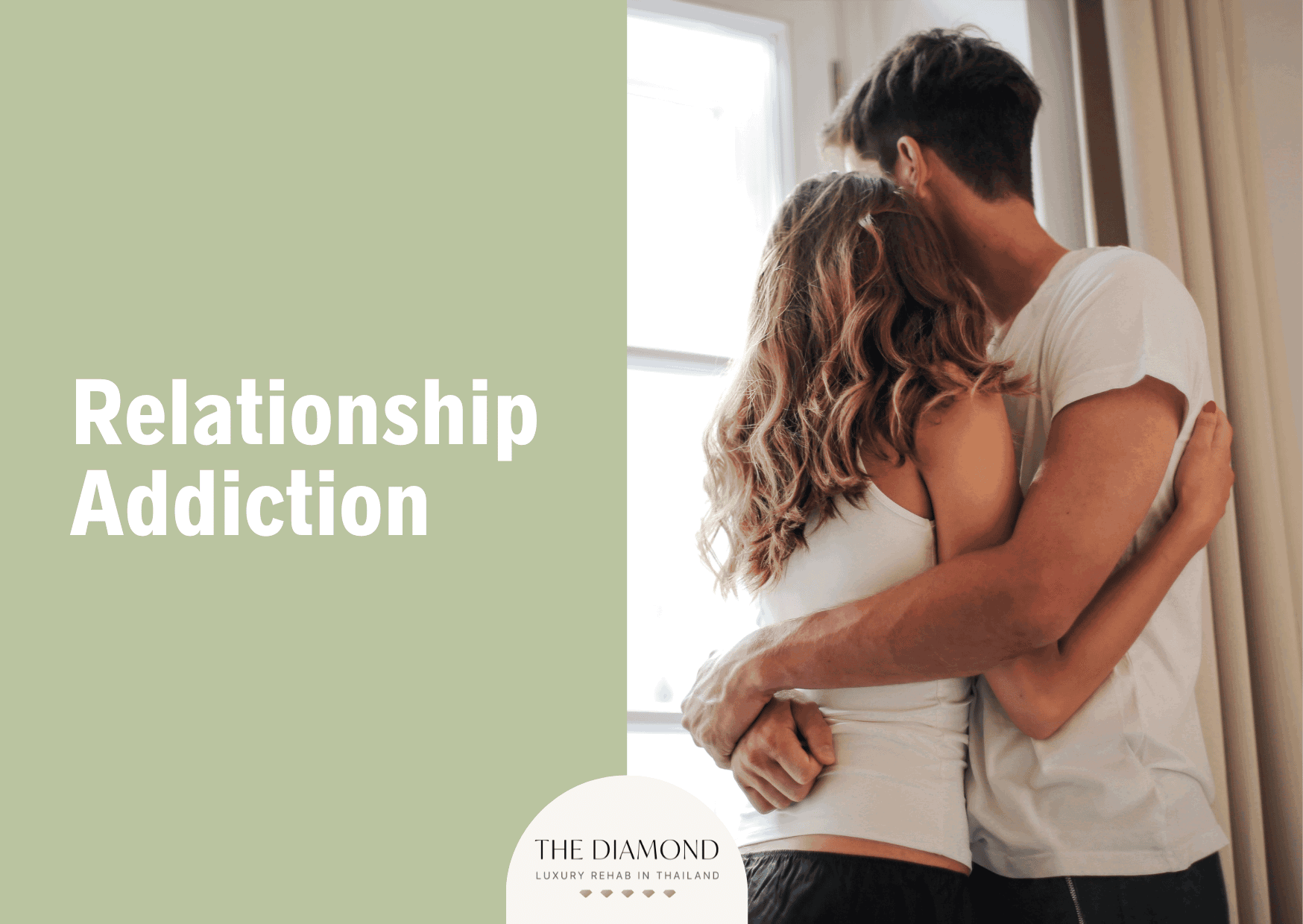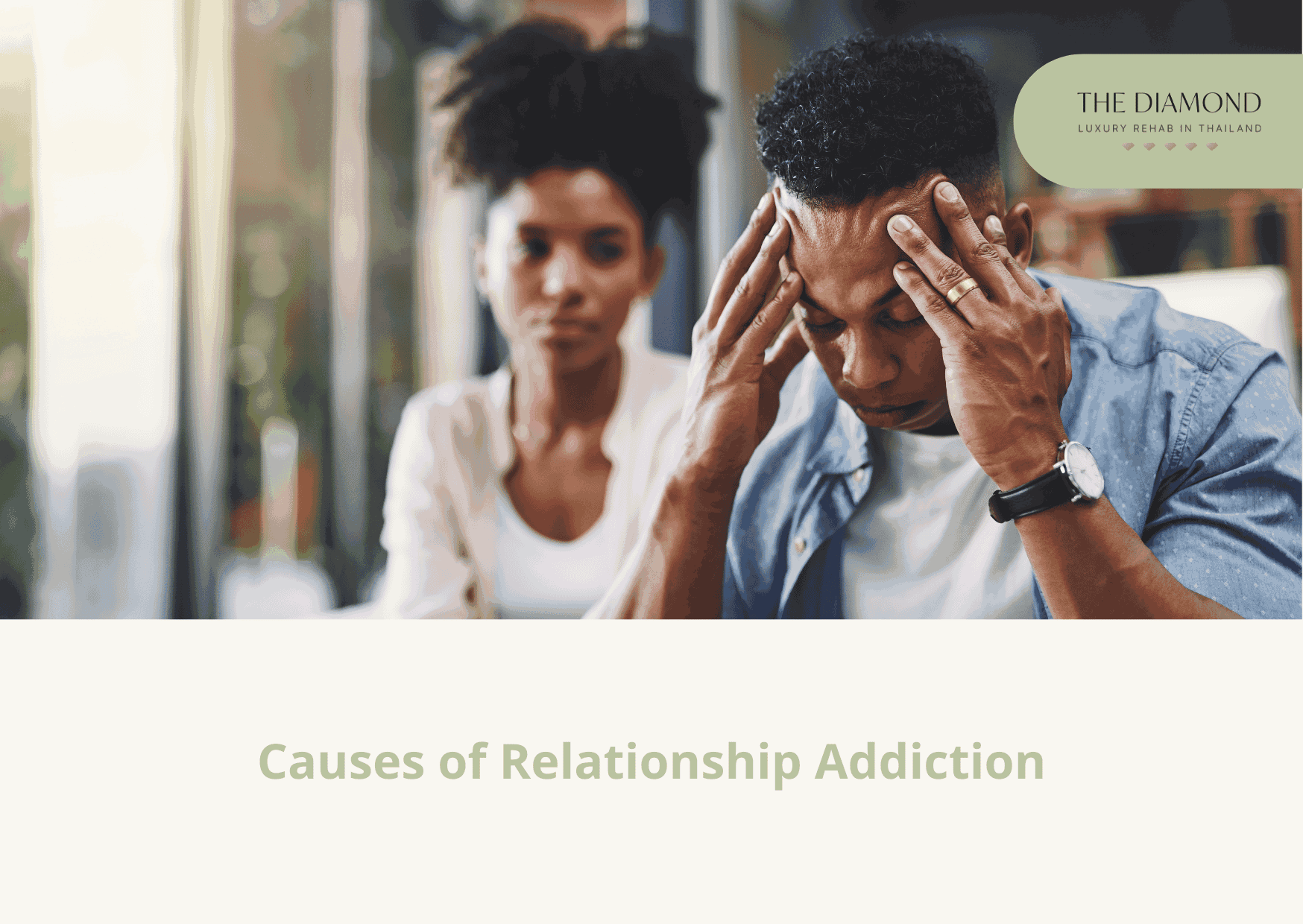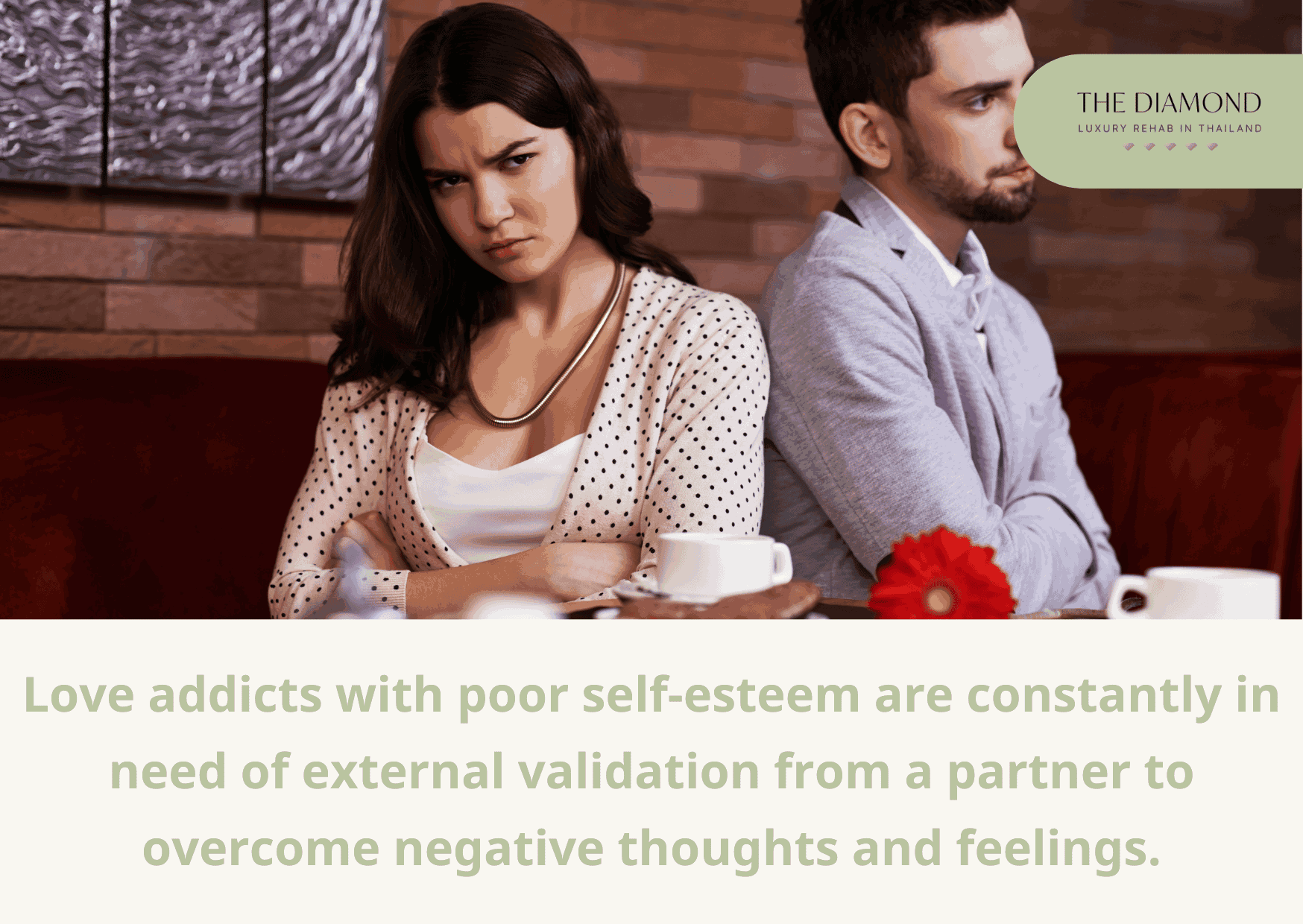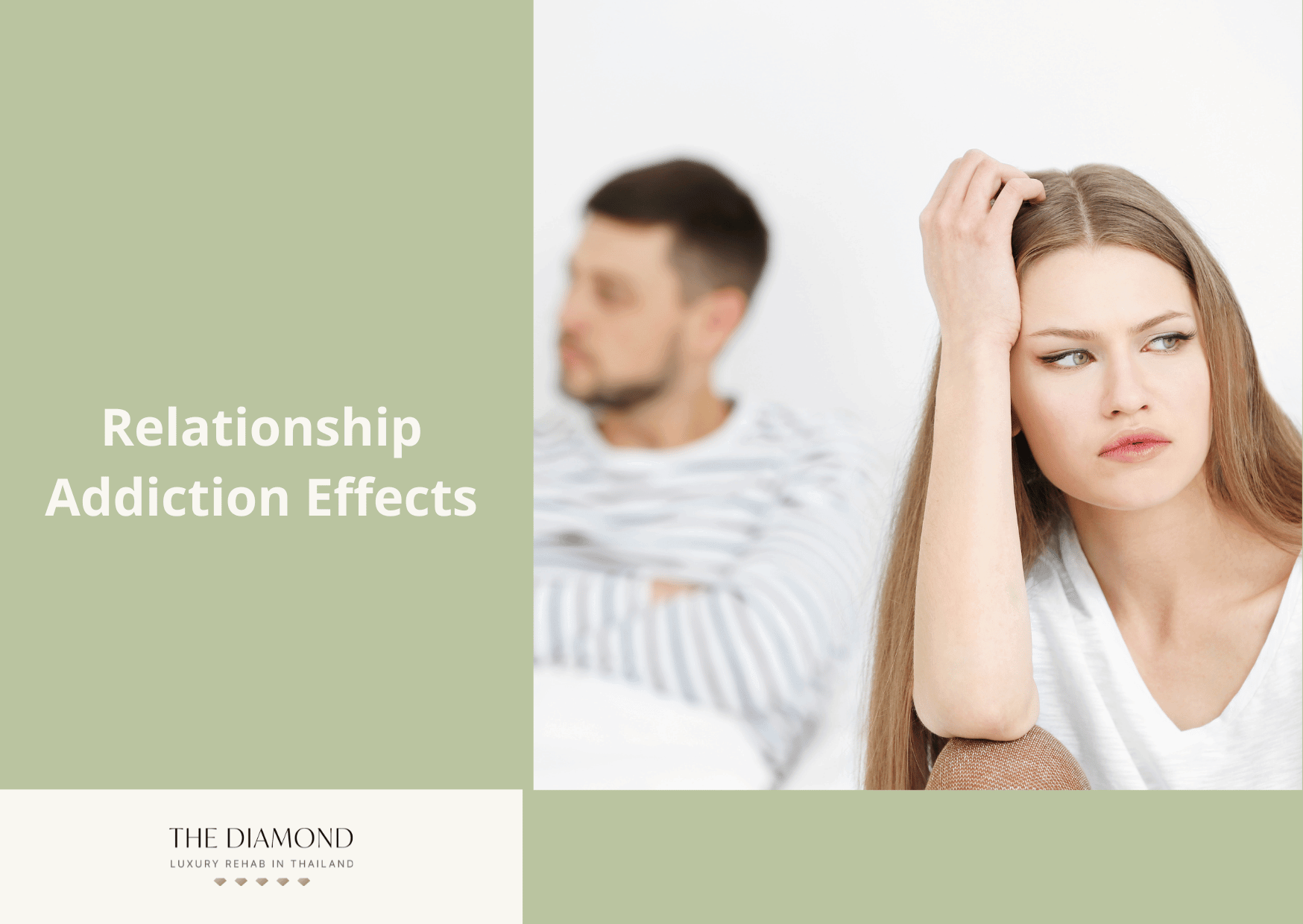Relationship addiction signs and treatments
Table of content
- What is relationship addiction?
- What are the signs of relationship addiction?
- What are the causes of relationship addiction?
- How to overcome relationship addiction?
- What is the relationship between relationship addiction and low self-esteem?
- What is the relation between relationship addiction and depression?
- What are the symptoms of relationship addiction withdrawal?
- How does relationship addiction affect you as an individual?
- What is the difference between relationship addiction and obsession?

Relationship addiction is the intense need for a romantic partner in order to function normally. A person who suffers from the disorder may love another person with an obsessive intensity, which negatively impacts not only the person at the center of the struggle, but the object of the addict’s obsession as well.
As with any other types of addiction, relationship addiction results from a complex interplay of different factors. The factors that affect relationship addiction include genetics, brain chemistry, and upbringing.
A love addict tends to engage in self-destructive patterns. For instance, having brief romantic relationships and jumping from one relationship to another. If involved in a long-term relationship, a love addict may fail to recognize when it is unhealthy.
As a result, the person may be unable to break off the relationship even when it already involves abuse. At times, an individual may also be aware that the relationship does more harm than good but keeps coming back to the same person over and over again.
What is relationship addiction?
Relationship addiction is an addictive disorder involving the continual feelings of longing and loss of control that are not in the best interest of both parties in the relationship.
It is characterized by the constant need to be in a relationship to feel complete and happy. This makes it easier for a relationship addict to not always end up with an ideal partner. However, a person suffering from the disorder may not care at all, as long as the relationship stays.
And yet, many people still ask, “Can you be addicted to a person?” An increasing number of experts support the existence of behavioral addictions and some argue that relationship addiction fits in this category.
What are the signs of relationship addiction?
The signs of relationship addiction may initially appear similar to normal behavioral patterns in a relationship. The signs of relationship addiction are listed below.
- A cycle of breakups and makeups: A lot of breaking up and getting back together is one sign of relationship addiction. Someone who suffers from the condition cannot bear to be alone for longer periods and will repeatedly initiate reconciliation after following breakups. This breakup and makeup cycle negatively affects the health of the relationship.
- Difficulty maintaining a life outside the relationship: Relationship addicts have a tendency to focus an immense amount of energy on relationships. As a result, these people tend to neglect other areas of life.
- Relationship obsessiveness: A relationship addict often feels overwhelmed by worries about the relationship. These people cannot stop thinking about what is not working or what could still be done to make the relationship better. This can lead to difficulty focusing at work or other areas of life. Obsessing over a partner can also end up causing problems for both parties in the relationship.
- The need for wrong people: People who suffer from relationship addiction fear the thought of being alone. This increases a relationship addict’s chance of settling for less. The consuming need for a relationship can make a person settle with a dangerous partner. For a love addict, this is better than being alone.
- Extreme highs and lows: Addictive relationships tend to be in a vicious cycle of extremely high highs and extremely low lows. This means that a relationship with a love addict can leave a partner feeling on top of the world one day and hit rock bottom the next. A relationship addict can also show signs of being physically sick when trying to walk away from the relationship, manifesting similar symptoms seen in someone cutting down on substance use.
- The need to change to be in the relationship: A love addict can feel the need to change oneself to stay in the relationship. These people often work to be someone or something else to satisfy the needs of a partner. This negatively affects the authenticity of the relationship and leaves a relationship addict feeling like they are not their best self.
- A battle against anxiety and depression: The destructive patterns present in an addictive love can make a person suffer from anxiety and depression. Often, these depressive moods are accompanied with feelings of being unloved, unsafe and abandoned. Ending addictive relationships can also leave a person so low that a love addict may consider suicide.
- An unhealthy dependence on relationships: A codependent relationship is a dysfunctional relationship where one person takes the role of a caretaker and the other person takes advantage of it. In this case, the love addict is more likely to be the co-dependent person who makes huge sacrifices to put a partner’s welfare and safety first. This leads to an individual losing contact with their own desires, needs, and sense of self, according to an article on co-dependency from Mental Health America.
- The use of substances to cope: The emotional roller coaster of an addictive relationship can make a person engage in addictive behaviors. These may include alcoholism, substance abuse, and overeating.
- The inability to leave: A love addict may find it extremely difficult to leave an unhealthy relationship. Relationship addicts may feel intense panic and fear when faced with the idea of breaking up. But when these people do leave, they have a tendency to reconcile with the partner, making them feel relieved and saved.
What are the causes of relationship addiction?

The causes of relationship addiction all play a role in the development of the disorder. The causes of relationship addiction are listed below.
- Chasing the euphoric feeling: According to a 2021 article titled, “What Is Love Addiction?” from Verywell Mind, studies show a connection between the euphoric feeling someone gets in the midst of being in love and the feelings of pleasure experienced by a person addicted to substances such as cocaine or alcohol. Both might experience symptoms such as loss of self-control, emotional dependency, mood swings, and compulsions, among several others.
- Having low self-esteem: Relationship addiction can stem from an underlying problem like low-self-esteem. As a result, people who suffer from the condition may rely on a partner for feelings of self-worth. A love addict may also feel inadequate in the absence of a partner.
- Struggling with abandonment issues in the past: One underlying cause of relationship addiction is abandonment issues. These problems are often experienced during childhood due to absent parents or guardians. Later in life, relationship addiction can also stem from abandonment of a spouse or a long-term companion.
- Living through childhood trauma: Childhood trauma is not limited to sexual abuse, verbal abuse, and physical abuse or neglect. Instead, it can result from having parents who were emotionally distant or who failed to give validation during critical moments in a child’s life. This can set a child up for a life of seeking unconditional love and affection. As a result of the trauma, a person may feel so unlovable that only the highs of a romantic relationship may give them consolation.
- Having experienced physical, emotional, or sexual abuse in the past: All kinds of abuse have a significant and lasting effect on children. Studies also show that childhood trauma causes increased vulnerability to addiction. The effects of abuse can follow people into maturity, creating a wide array of mental health issues that may cause love addicts to self-medicate by finding solace with a partner.
How to overcome relationship addiction?
The essential first step in overcoming relationship addiction is admitting that the problem exists and that it needs to be addressed through a conscious effort. Individuals who are addicted to a person are often unaware of how addictive behaviors negatively affect someone.
Therefore, it is important for a person who suffers from relationship addiction to gain awareness of the impact of these behaviors to other people. However, awareness is usually not enough. A love addict also needs to learn new skills to help cope with the condition.
For instance, since romantic relationships are heavily influenced by early childhood experiences with caretakers, becoming fully aware of one’s past experiences in life may be helpful. After all, negative childhood experiences tend to pull people toward certain types of people who are as equally incapable of maintaining a healthy relationship.
It also helps to step back and take a break from relationships in the meantime. This way, one can have an alone time to explore the triggers for relationship addiction and identify any destructive patterns the person has repeatedly been in. Not being involved with a romantic partner also gives the person a chance to take notice of other strong relationships that are worthy of attention, including those with family and friends.
What is the relationship between relationship addiction and low self-esteem?
Relationship addiction is closely tied with low self-esteem. Low self-esteem increases an individual’s tendency to addiction. In the case of relationship addiction, love addicts with poor self-esteem are constantly in need of external validation from a partner to overcome negative thoughts and feelings.
People who suffer from the disorder have a belief of not being worthy of self-respect and self-worth. Relationship addicts have a very pessimistic view of the future even to the point of becoming convinced that the life of addiction is the only way there is.
Low self-esteem keeps individuals trapped in the vicious cycle of addiction to people. Love addicts often cannot imagine life without a partner who has become a source of self-esteem. This makes it harder for an individual to develop the motivation needed to move past the addictive behaviors without professional help. Low self-esteem adds a significant burden on a relationship addict’s struggle.

What is the relation between relationship addiction and depression?
A positive correlation exists between relationship addiction and depression in the sense that people who suffer from depression also often struggle with some kind of addiction. This is known as dual diagnosis.
According to results from the 2014 National Survey on Drug Use and Health published by The Substance Abuse and Mental Health Services Administration (SAMHSA), 7.9 million Americans have dual diagnoses. A dual diagnosis is when someone suffers from both an addiction and a mental health condition such as depression.
Both disorders can affect one another. For instance, the volume of people struggling with depression get involved in romantic relationships as a way to cope with symptoms of depression. Similarly, any stress that comes from relationship addiction can also result in depression, poor work performance, and neglecting self-care.
Is relationship Addiction treated in rehab?
Yes, relationship addiction can be treated in rehab. It can be addressed similarly to other forms of addiction. Although treatment for people with relationship addiction can be tricky because it is not a universally recognized form of mental health condition, diagnosis and treatment can still be done at a doctor or therapist’s discretion.
Several underlying causes can exist underneath the condition. Because of this, treatment often involves looking at early childhood issues and how these experiences relate to the love addict’s current destructive behavior patterns. This way, the root of the problem can be addressed so that the individual in question can move forward to creating healthy and fulfilling relationships.
Depending on the person’s choice of relationship addiction rehab center, varying types of therapies can be used for treatment, including cognitive behavioral therapy (CBT), experiential therapy, mindfulness practices, family therapy programs, and group therapy.
What are the symptoms of relationship addiction withdrawal?
The symptoms of relationship addiction withdrawal can be physical and emotional. Someone who is addicted to relationships can come off a breakup and struggle with several relationship addiction withdrawal symptoms.
A 2021 review article on the proximate and ultimate perspectives on romantic love published in Frontiers in Psychology also states that findings from research on romantic rejection may be comparable to the withdrawal/negative effect phase of addiction.
Physical symptoms include lack of energy and fatigue, insomnia, weight loss due to changes in appetite, tension, nausea, and other flu-like symptoms.
Emotional symptoms of relationship addiction withdrawal can include feelings of loneliness, anxiety, restlessness, intense feelings of grief or loss, frustration, worried thoughts, denial, irrational thoughts, feeling out of control, irritability, and other mood changes.
According to an article titled, “Love Addiction Withdrawal – What it means and how to deal with it” from Love Addiction Help, for love addicts, being rejected by an ex-partner sends a false message that exacerbates feelings of unworthiness. Unconsciously, one way love addicts cope with withdrawal symptoms is through denial. This involves obsessive behavior toward the other person or thinking that an ex-partner was not so bad at all.
How does relationship addiction affect you as an individual?

Relationship addiction can negatively affect an individual, with both short and long-term adverse outcomes. One example is its tremendous effect on the brain. The brain allows a person to interpret sensory impressions as well as one’s thoughts and emotions.Ultimately, these factors affect a love addict’s behavior.
People struggling with relationship addiction are often hooked on the high of falling in love. Dopamine, serotonin, and oxytocin are all produced in these people’s brains when they feel attracted to someone. This process of releasing happy hormones causes a love addict to feel a surge of positive emotion, according to a 2023 article titled, “Why Is Oxytocin Known as the ‘Love Hormone’? And 11 Other FAQs” from Healthline.
Becoming hooked to this familiar feeling or responding to powerful emotions means the love addict is also experiencing emotional addiction. As a result, the person becomes dependent on the relationship and uses it to cope with negative feelings such as anxiety and depression.
Relationship addiction affects an individual’s life in general. Once the addiction takes hold of the person, it becomes a priority in one’s life. Focusing a tremendous energy on a romantic relationship means that the person would have less time for other activities or hobbies outside the relationship.
These people may also constantly talk about a partner even when around friends or loved ones. But it is also possible that love addicts stay away from family or friends to allot more attention on the relationship.
The condition also takes a toll on one’s work life. The attendance and work performance of a person engaging in addictive behaviors around relationships may suffer since not much attention is given anymore on anything else except for the individual’s partner.
Is relationship addiction treated in support groups?
Yes, relationship addiction may be treated in support groups. People who have gone through similar situations or experiences often find comfort in joining a support group. Each member receives support, comfort, and encouragement from the group as a whole at their regular meetings, a 2023 article titled, “How Can I Find Support Groups Near Me?” from Verywell Mind states.
Support groups for relationship addiction are listed below.
- Sex and Love Addicts Anonymous: Sex and Love Addicts Anonymous is a 12-step relationship addiction support group for people who compulsively engage in or avoid sex, love, or emotional attachment. Individuals with current, former, or even suspected signs of being addicted to a person can be a part of the recovery community.
- Co-Dependents Anonymous: Founded in 1986 in Phoenix, Arizona, Co-Dependents Anonymous is a 12-step program for individuals who desire to develop healthy and loving relationships.
- Love Addicts Anonymous: A 12-step program for individuals who want to recover from unhealthy dependency on love.
What is the difference between relationship addiction and obsession?
The difference between relationship addiction vs. obsession is relationship addiction is often rooted in a lack of satisfaction while obsession is rooted in fear. For instance, relationship addicts never feel satisfied unless a romantic partner is present to fill a void. The lack of satisfaction can stem from negative thought patterns, low self-esteem, or traumatic experiences from childhood.
On the other hand, people engaging in obsessive behaviors feel the need to perform a compulsive routine or else negative consequences will result. Fear of outcomes such as negative opinions from other people, loss of opportunity to experience something, or even death can lead to obsessive behavior.
An obsession can also turn into an addiction. For instance, when a person is obsessed with the rewarding feeling of having a romantic partner, the individual can become addicted to that familiar feeling.
This also explains why addictive relationships are characterized by obsessive attention that is given to a partner while an inadequate amount is only given to oneself.

